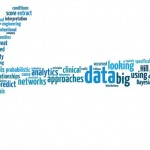Big Data in My Life
I never actually realized how much big data affects my life. In the past day I recorded all of the ways I am connected to big data, and while I am nowhere near the amount of data Hari Gottipatti uses, I was surprised to discover that any move that I made online was my contribution to big data.
My day of tracking big data in my life was an average day. I drove from home back to my apartment, went to class, went out to eat with friends, and applied to a few jobs. However, my big data contribution started before I even woke up with my Timehop app letting me know what I had posted years earlier on the same day, followed by emails from different sites I had subscribed to about job postings, sales, and other events that were practically tailor made for me. After waking up, I like to stay in bed and scroll through social media, so Facebook, Instagram, Snapchat, Pinterest, and Tumblr were all clicked on before 9 AM, and a couple times after as well. Between morning and afternoon, I had also been on MyPack and Moodle, checking out some school things and finishing up some assignments. I also had attended my one class that had a student connect from another campus via webcam, having the whole class being recorded by tech at both NC State and UNC Charlotte. Finally in the evening, I had gone out to dinner for a friend’s birthday celebration, and I paid with a card. With the whole day over with, I set an alarm for the next day on my iPhone and went to sleep.
Going through this day of data tracking made me realize how often I actually check social media, despite not always posting things. I think I like to be updated on things that are going on with my friends and things that are going on around the world. I also feel like constantly checking social media and being connected to everything through a smartphone shows my need to be informed all the time. I think that having access to everything to something that is attached to me 24/7 is not uncommon however for many people these days.
While I think I would want to disconnect and opt-out of big data, I feel it is not possible. I could disconnect from all of the social media sites that exist, but the world practically runs on email and almost every aspect of my academic life requires being included in big data. More and more our personal, academic, and professional lives contribute to big data.
This assignment has made me question how much we give to big data without thinking twice about it. Already with big data, our locations and data trails can be tracked easily. So what’s next? Will we be allowing ourselves to be chipped to be accounted for by the government or possibly a private agency? We may laugh off the question now, but maybe one day it would be just another part of our day.
 Previous Post
Previous Post
Thanks for the interesting post. Please make sure that you add a “featured image” to it as well.
One of the things I’ve been thinking about lately is how cheaply we can be persuaded to give up our data. We do it for free to be able to use something like Facebook, but also for only a few dollars savings from something like a grocery rewards card. I’m wondering what would happen if we up the stakes? For example, what if the NSA partnered with IRS and offered a $1,000 tax rebate if they could – legally – install plugins that track our cell phone data and browser history. How many people would do that? And how long before it appears incriminating if you don’t?
Hey Nisha! So I don’t think your tomorrow question is too far away. My mind always jumps to the medical side of things since I’m a BME major, and I imagine that personal or prescribed monitoring devices will only upgrade their ability to track and adapt to data. You can give ‘biohackers’ some googling. I remember reading an article a few years back on some people out in Washington putting RFID chips in their wrists. They probably identified with this biohacking movement, and to my knowledge, RFID chips are just the beginning. Once data-collecting medical devices are used, it will only be a matter of time before the NSA is trying to get their hands on that information.
Thanks for the BME perspective on this!